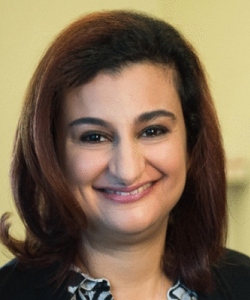
Speaker: Magy Seif El-Nasr
Affiliation: UC Santa Cruz
ABSTRACT:
Interactive 3D environments, social simulations, and digital games are emerging as platforms used for entertainment, health, education, training, and citizen science, to mention a few applications. The potential social impact of these environments on such a wide variety of application domains elevates the importance of developing novel methods that can optimize and personalize their designs as well as assess their utility. These topics have received much attention within the communities of Human Computer Interaction (HCI) and games research. In the past few years, I have argued that open (transparent) process modeling techniques can produce beneficial results that can push the needle on the design and personalization of such systems potentially increasing their social impact. For the past decade, my research lab has focused on developing process mining and visualizations systems to model, capture, and understand the users’ behaviors within games, social simulation, and social media as well as assessing their social impact. In this talk, I will start by discussing some example serious games we have developed within my lab. I will then use these examples as case studies to discuss the open process modeling systems we have developed. We are currently investigating the use of these systems to model learning, decision-making, teamwork, emotions, and resilience. I will conclude by discussing some of these prospects and opportunities.
BIO:
Magy Seif El-Nasr is a Professor and Department Chair of Computational Media at the University of California, Santa Cruz, where she directs the Game User Interaction and Intelligence (GUII) Lab. Dr. Seif El-Nasr earned her Ph.D. degree from Northwestern University in Computer Science in 2003. Her research focuses on two goals (a) developing automated tools and techniques for authoring, adapting, and personalizing virtual environments (e.g., interactive narrative, believable agents, and games), and (b) developing evidence-based methodologies to measure the effectiveness of game environments through the development of novel process mining and visual analytics systems. She worked in collaboration with several game companies both in the serious as well as the entertainment game spaces. She published the first book on the subject of: Game Analytics, called Game Analytics: Maximizing the Value of Player Data. She recently published a new textbook called Game Data Science outlining the standard methods used for data science within game research and industry. Her work is internationally known and cited in many communities, including HCI, graphics, affective computing, and game research. Additionally, she has received several awards and recognition within the HCI, Agents, and games research communities. Notably, she received five Best Paper Awards, one exceptional paper, and two honorable mentions. Further, she was named a HEVGA (Higher Education Video Game Alliance) Fellow. She also serves as an associate editor for IEEE Transactions on Games, IEEE Transactions on Affective Computing, and Human Computer Interaction.
Hosted by Professor Yizhou Sun
Date/Time:
Date(s) - Oct 27, 2022
4:15 pm - 5:45 pm
Location:
3400 Boelter Hall
420 Westwood Plaza Los Angeles California 90095
